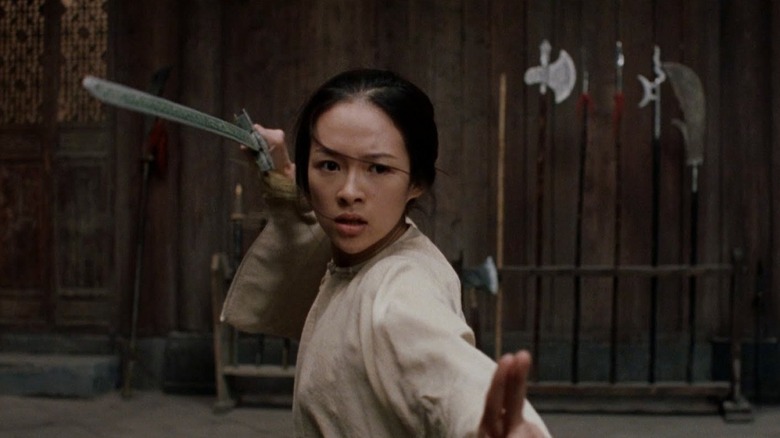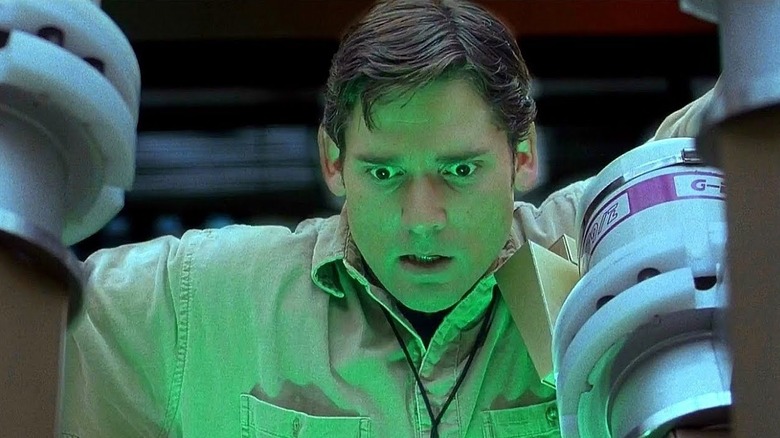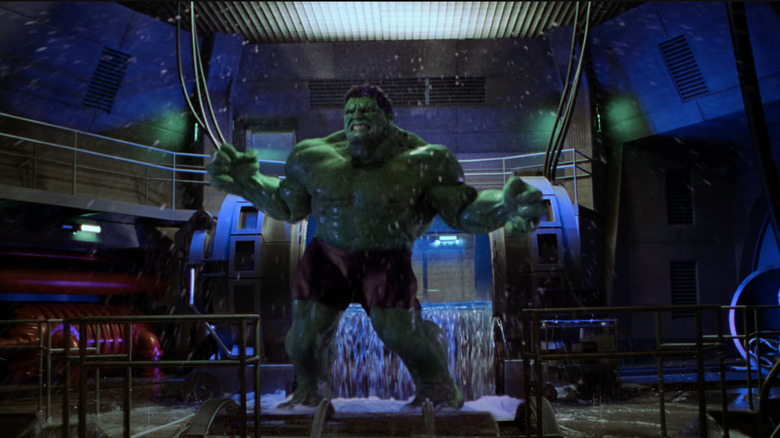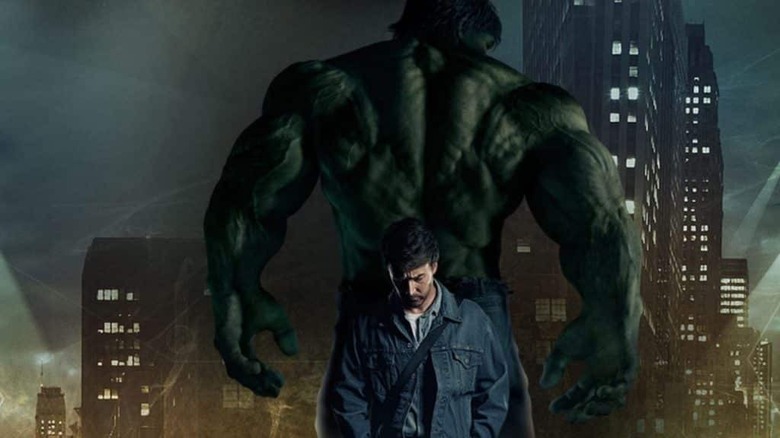Ang Lee Saw The Hulk As A Natural Evolution After Crouching Tiger, Hidden Dragon
2003's "Hulk" is an anomaly. We haven't had a filmmaker in Ang Lee's mold direct a superhero movie since and probably won't for a long time, if ever again. As /Film as argued before, "Hulk" doesn't always work, but it grasps for heights the Marvel Cinematic Universe wouldn't dream of even trying to reach.
Lee's filmography tells a story, that of a director who never stops experimenting. He has the style of an auteur but traverses genres like a journeyman. Lee began by making comedy films in his native Taiwan, such as "The Wedding Banquet" and "Eat Drink Man Woman." In 1995, he adapted Jane Austen with "Sense and Sensibility." The story's genre wasn't that unfamiliar of territory for him, but it was his first primarily English language film.
He went further west in the rest of the 1990s, first helming the drama "The Ice Storm" before going for the ultimate American genre with the western "Ride With The Devil." When the '90s ended, it was time for Lee to shift again by making a Wuxia film with "Crouching Tiger, Hidden Dragon"; the film may be set in China, but it was an international success.
What else could complete Lee's experimentation with action-heavy genres then by making a superhero movie, the most American of all blockbusters? Hence, "Hulk."
Hulk's journey to the big screen
Like "Spider-Man," development of "Hulk" stretched back to the 1990s, but it's journey to the silver screen took years — and multiple guides. The project was almost a "Jumanji" reunion between director Joe Johnston and screenwriter Jonathan Heinsleigh, but that fell through. The final film has three credited screenwriters: Michael France, John Turman, and Ang Lee acolyte James Schamus. These men were not co-writers, but worked on the film at different points throughout development.
Producer Avi Arad wanted a "character-based director" for "Hulk." After all, most superhero stories are purely external conflicts, but Bruce Banner has no greater adversary then the turmoil that lives within him. Ang Lee fit the bill, but what attracted him to "Hulk"? When Lee spoke with IGN upon the film's release, he said it was, "The rare chance to do a personal film on a big canvass."
Modern myth
"Superheroes are modern myth" is a talking point often repeated these days. While not everyone agrees, Lee certainly did. Listing his influences on "Hulk" to IGN, he mentioned: "'King Kong,' 'Frankenstein,' 'Jekyll and Hyde,' 'Beauty and the Beast,' 'Faust,' and a lot of Greek mythology."
The Hulk's comics were already a melting pot of these tales, dealing with themes of outcasts, science gone wrong, and split identity. Lee's references to mythology is the most interesting wrinkle, because it's where his wrinkle to the story lies. In the comics, Bruce Banner (Eric Bana in the film) had an abusive father, Brian. Lee's film expanded on this; Banner's father, renamed David (Nick Nolte), experimented on his son, planting the seeds for him to become the Hulk. Now, like Cronus devouring his children, David must absorb Bruce's energy to extend his own life.
Lee saw "bringing together the pop genre and psychodrama" as an extension of his work on "Crouching Tiger, Hidden Dragon" (via BlackFilm). That film's fantastic, gravity-defying fight choreography is what's easiest to recall about it. However, the heart of the story is two sets of lovers who can't be together: Li Mu Bai (Chow Yun-Fat) & Yu Shu Lien (Michelle Yeoh) and Jen Yu (Zhang Ziyi) & Lo Xiao Hou (Chang Chen).
Where "Hulk" was a break from Lee's usual style was the visuals. Lee explained:
"I have never worked with CGI let alone using the most advanced technology in film... The editing process was difficult; constantly making sure the scenes play right."
Speaking of editing, the most striking part of "Hulk" is how it used unique effects like freeze frames and split screens to mimic the look of comic panels. Lee wasn't out to adapt a comic to film, but to translate a medium's visual language into another.
Post-Hulk
Upon release, "Hulk" had its defenders. Roger Ebert called it, "the most talkative and thoughtful recent comic book adaptation." For the most part, though, Lee's approach wasn't one that audiences connected with. It underperformed at the box office and most critics regarded it as an ambitious failure. A common complaint was that "Hulk" seemed afraid to be a superhero movie.
Lee's career didn't take much of a hit, though. He went back to directing dramas and found great success with "Brokeback Mountain," "Lust, Caution," and "Life of Pi." As for the Jolly Green Giant himself, his next film, Louis Leterrier's "The Incredible Hulk," was more of an action-first slugfest. Lee's "Hulk" was ponderous, while Leterrier's used "The Fugitive" style set-up of the 1970s "Incredible Hulk" TV series, giving the story more forward momentum. All it cost the movie was depth. Star Edward Norton's sensibilities weren't as artsy as Lee's, but he still wanted more of character-focused film. As he vented during a Comedy Central Roast of Bruce Willis, "I thought we should try to make one Marvel movie that was as good as the worst Chris Nolan movie, but what the hell was I thinking?"
It's clear why Norton won't be trying his hand at superheroes again, but would Lee? His 2019 "Gemini Man" showed he's not adverse to helming action movies and still has the skill to pull them off. If "Hulk" is any indication though, the type of superhero movies Lee would make aren't the ones Hollywood wants. That's a loss, because when artists experiment as consistently Lee does, all art thrives.



